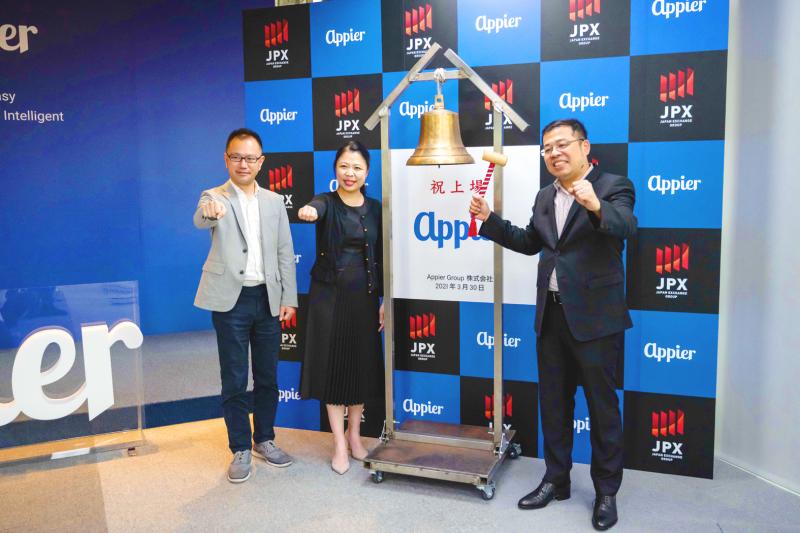Shares of Appier Group Inc (沛星互動科技), which offers artificial intelligence (AI)-based software, yesterday rose above their listing price in the company’s trading debut on the Tokyo Stock Exchange, proceeding to raise ¥29.8 billion (US$271 million) in an initial public offering (IPO) priced at the top of its marketed range.
The Taiwanese company’s shares were priced at ¥1,600 apiece in the IPO and got a significant bounce at the open, rising as much as 37 percent in early trading before paring gains to close up 19 percent at ¥1,900.
Softbank Group Corp and ASEAN China Investment Fund III were among holders who offered shares, with Masayoshi Son’s firm holding about a 4.4 percent stake, company filings showed.

Photo: Billy H.C. Kwok, Bloomberg
While Tokyo has been attempting to attract more foreign companies amid a broader push to become a financial hub, such listings remain unusual.
Appier is the first firm from Taiwan to list in Tokyo since Trend Micro Inc’s (趨勢科技) debut in 1998, the Nikkei reported.
“Japanese investors have a high acceptance of the artificial intelligence theme and the market accounts for a large part of our revenue,” Appier cofounder and chief executive officer Yu Chih-han (游直翰) said in a news briefing, explaining why the firm chose Japan.
Appier’s debut comes amid a broader sell-off in technology shares as investors rotate out of loftily valued growth stocks into more economically sensitive sectors, such as banking.
Chinese tech names have especially slumped due to a combination of rising interest rates and increased regulatory scrutiny in the US and China.
The listing on the Mothers market follows the debut of Internet giant Baidu Inc (百度) in Hong Kong on Tuesday last week.
“Many software companies opt for the US market because software valuations tend to be higher there, but successful listings in other markets could begin to open up other opportunities for companies to consider,” Bloomberg Intelligence analyst Matthew Kanterman said.
Last week, Appier and shareholders sold 18.6 million shares, after marketing them at ¥1,400, ¥1,500 or ¥1,600 apiece.
Appier said that its AI-based software is used by customers, including Alphabet Inc, Toyota Motor Corp and Estee Lauder Co, to improve profitability.
The company said that it plans to use the proceeds of the share sale to support growth, including funding research and development.
The company had a net loss of ¥1.45 billion on sales of ¥8.97 billion last year.
The offering was led by SMBC Nikko Securities Inc, Bank of America Corp and Mizuho Securities Co.

Taiwan will prioritize the development of silicon photonics by taking advantage of its strength in the semiconductor industry to build another shield to protect the local economy, National Development Council (NDC) Minister Paul Liu (劉鏡清) said yesterday. Speaking at a meeting of the legislature’s Economics Committee, Liu said Taiwan already has the artificial intelligence (AI) industry as a shield, after the semiconductor industry, to safeguard the country, and is looking at new unique fields to build more economic shields. While Taiwan will further strengthen its existing shields, over the longer term, the country is determined to focus on such potential segments as

UNCERTAINTY: Innolux activated a stringent supply chain management mechanism, as it did during the COVID-19 pandemic, to ensure optimal inventory levels for customers Flat-panel display makers AUO Corp (友達) and Innolux Corp (群創) yesterday said that about 12 to 20 percent of their display business is at risk of potential US tariffs and that they would relocate production or shipment destinations to mitigate the levies’ effects. US tariffs would have a direct impact of US$200 million on AUO’s revenue, company chairman Paul Peng (彭雙浪) told reporters on the sidelines of the Touch Taiwan trade show in Taipei yesterday. That would make up about 12 percent of the company’s overall revenue. To cope with the tariff uncertainty, AUO plans to allocate its production to manufacturing facilities in

COLLABORATION: Given Taiwan’s key position in global supply chains, the US firm is discussing strategies with local partners and clients to deal with global uncertainties Advanced Micro Devices Inc (AMD) yesterday said it is meeting with local ecosystem partners, including Taiwan Semiconductor Manufacturing Co (TSMC, 台積電), to discuss strategies, including long-term manufacturing, to navigate uncertainties such as US tariffs, as Taiwan occupies an important position in global supply chains. AMD chief executive officer Lisa Su (蘇姿丰) told reporters that Taiwan is an important part of the chip designer’s ecosystem and she is discussing with partners and customers in Taiwan to forge strong collaborations on different areas during this critical period. AMD has just become the first artificial-intelligence (AI) server chip customer of TSMC to utilize its advanced

Chizuko Kimura has become the first female sushi chef in the world to win a Michelin star, fulfilling a promise she made to her dying husband to continue his legacy. The 54-year-old Japanese chef regained the Michelin star her late husband, Shunei Kimura, won three years ago for their Sushi Shunei restaurant in Paris. For Shunei Kimura, the star was a dream come true. However, the joy was short-lived. He died from cancer just three months later in June 2022. He was 65. The following year, the restaurant in the heart of Montmartre lost its star rating. Chizuko Kimura insisted that the new star is still down